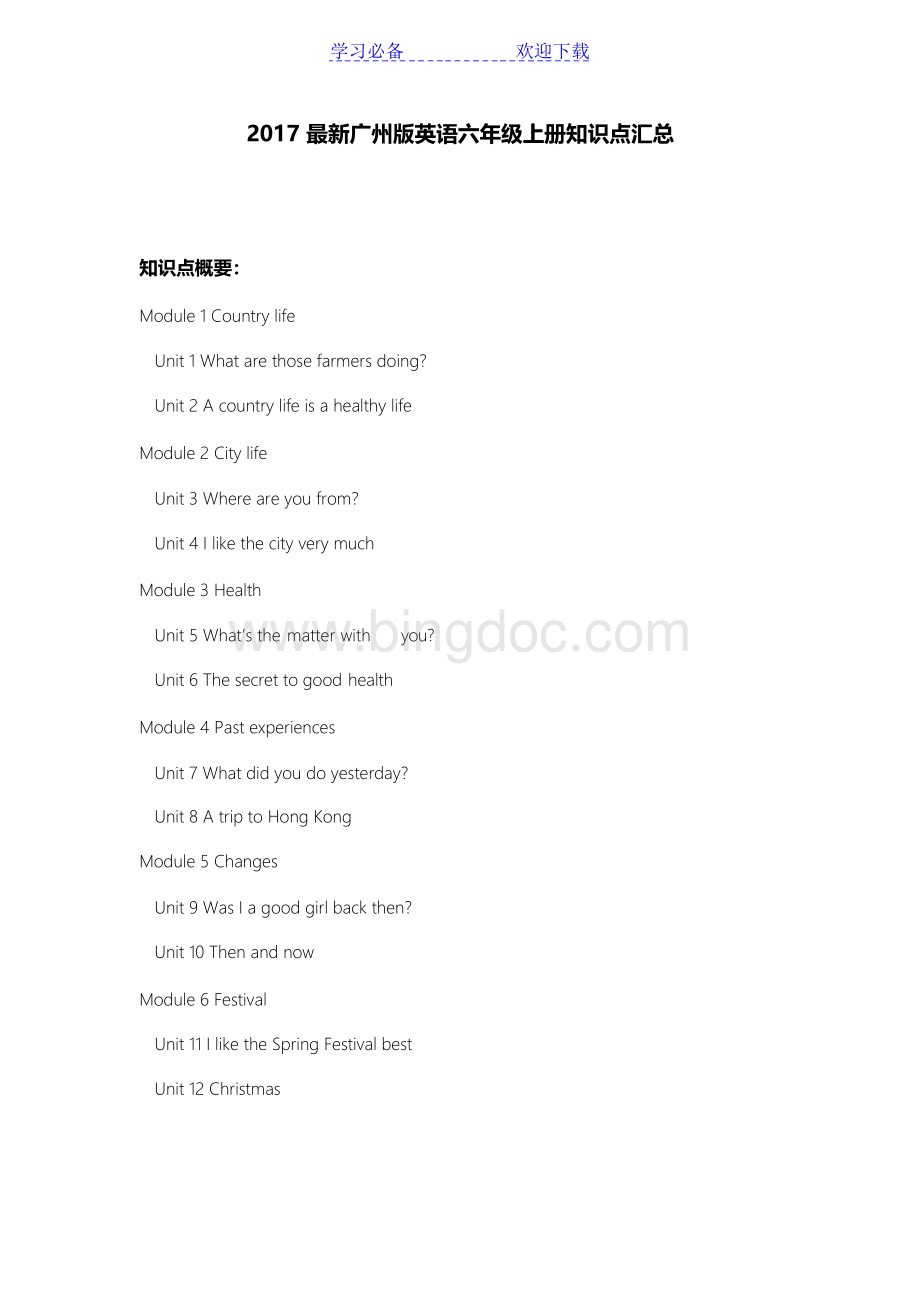最新广州版英语六年级上册知识点汇总.docx
《最新广州版英语六年级上册知识点汇总.docx》由会员分享,可在线阅读,更多相关《最新广州版英语六年级上册知识点汇总.docx(36页珍藏版)》请在冰点文库上搜索。

学习必备
欢迎下载
2017最新广州版英语六年级上册知识点汇总
知识点概要:
Module1Countrylife
Unit1Whatarethosefarmersdoing?
Unit2Acountrylifeisahealthylife
Module2Citylife
Unit3Whereareyoufrom?
Unit4Ilikethecityverymuch
Module3Health
Unit5What’sthematterwith you?
Unit6Thesecrettogoodhealth
Module4Pastexperiences
Unit7Whatdidyoudoyesterday?
Unit8AtriptoHongKong
Module5Changes
Unit9WasIagoodgirlbackthen?
Unit10Thenandnow
Module6Festival
Unit11IliketheSpringFestivalbestUnit12Christmas
以下为详细内容
▼
Module1Countrylife
Unit1Whatarethosefarmersdoing?
一、词组
feedthechickensandducks
feedthepigs
feedthehorse
growflowersandvegetables
planttrees
cutgrass
anyother onthefarm
afew…
二、句型:
1.Whatarethosefarmersdoing?
They’recuttinggrasstofeedtheanimals.
2.Whatdoyougrowonyourfarm?
3.Wehaveafewgoatsandpigs.
4.Therearefruittreesinthisfield.
5.Thereisacowonthefarm.
三、重点精析:
1.anyother+名词单数,指一堆当中的的某一个
anyother+名词复数,指一堆当中的一些
如:
Tomrunsfasterthananyotherstudentinhisclass.
汤姆比他班上的任何人都跑得快。
Areyoutakinganyotherdrugsatpresent?
你现在还有服用其他的药吗?
2.表示肯定意义:
alittle/afew有一点,有一些表示否定意义:
little/few 几乎没有的
afew/few+可数名词复数little/alittle+不可数名词many/much意为很多的
many+可数名词复数 much+不可数名词
3.usesth.todosth. 用……做某事
我用钢笔写信。
4.manyofthem 他们中的许多人
manyofus manyoftheboys manyoftheyoungmen
5.befrom=comefrome 来自……
他来自中国。
6.also;too;either的区别
(1)also意思是“也”,是比 too较为正式的用语,通常用于肯定句中,一般靠近动词。
如:
Healsoaskedtogo.他也要求去。
Ialsowent.我也去的。
Hecamealso.他也来的。
(2)too意思也是“也”,是最普通的用语,常与 also通用,但不如also正式,在口语
中它用得更多。
too通常放有句末,它也通常用于肯定句中。
如:
Iwentthere,too.我也到那儿去的。
Motherwasangrytoo.母亲也发怒了。
(3)either意思也是“也”。
它用于否定句中,而且要放在句末。
如:
Ifyoudonotgo,Ishallnoteither.倘若你不去,我也不去
7.give…to… 把……给……givesth.tosb.= givesb.sth.
如:
Amygivesmeabook.=Amygivesabooktome.
8.Thereisacowonthefarm.
Therebe是英语中常用句型,意思是“有”,表示“人或事物的存在”。
There在此结构中是引导词,已经没有副词“那里”的含义。
当主语是可数名词单数或不可数名词时,be动词要用is;当主语是可数名词复数时,be动词要用are;而它的否定形式是在be动词后面加not。
同时,改为一般疑问句只需要把be动词提前。
肯定回答为“Yes,therebe.”
否定回答为”No,therebenot.”
如:
Therearefivebooks,twopensandarulerintheschoolbag.Thereisaruler,twopensandfivebooksintheschoolbag.
四、重点语法:
(一)名词单复数
(1)从单数变复数,变形规则如下:
1、一般情况下,直接加-s。
如:
book-books,bag-bags,cat-cats,bed-beds
2、以s.x.sh.ch结尾,加-es。
如:
bus-buses,box-boxes,watch-watches
3、以“辅音字母+y”结尾,变 y为i,再加-es。
如:
family-families(家庭),strawberry-strawberries(草莓)
4、以“f或fe”结尾,变f或fe为v,再加-es。
如:
knife-knives
5、不规则名词复数:
man-men woman-women policeman(男警察)-policemenpolicewoman(女警察)-policewomen mouse-mice child(孩子)-childrenfoot-feet tooth-teeth
单复同行:
fish-fish sheep(羊)-sheep people-peopleChinese-Chinese Japanese-Japanese
6、注意:
当people后加上s时,即peoples表示“民族”例如:
Thereare56peoplesinChina.中国有56个民族。
7、不可数名词:
water(水)milk(牛奶)tea(茶)rice(米饭)orange(橙汁)juice(果
汁)bread(面包)等注意:
1)可数名词,当表示“1”时用 a还是an,由后面的单词的首个因素决定,辅音音素前用
“a”,元音音素前用“an”。
如:
abook anEnglishbook
2)不可数名词前不能用a或an,常用some,much,alittle,alotof,plentyof表示多少
3)用单位词表示,即用a…of+名词表示。
如:
acupof一杯……abottleof一瓶……apieceof一张……abasketof一篮……acanof一罐……abagof一袋……apairofshoes一双鞋twocupsoftea两杯茶
fivepiecesofpaper 五张纸
Unit2Acountrylifeisahealthylife
一、词组
wakeup morethan plentyof rideabikegethome atthattime thanksfor lotsof…
二、句型
1.Acountrylifeisahealthylife.
2.Ittakesabout40minutes.
3.IamalwaysverybusybutIneverfeeltired,becauseIhaveplentyofexercise.
4.WhenIgethomeafterschool,thereisstillmuchworktodo.
三、重点精析:
1.livein+大地点 liveat+小地点(如街道、街区等) liveon+楼层
2.helpsb.(to)dosth.帮助某人做某事
helpsb.withsth. 帮助某人做某事
有时候我帮我妈妈清洁房间。
我喜欢帮妈妈做家务。
3.morethan+数词 超过,多于
如:
Morethanthirtystudentsareboysinourclass.
morethan+名词 不仅仅是
如:
Joeismorethanawriter;heisacook,too.
morethan+形容词 很,非常如:
I’mmorethanhappytoseeyou.
4.plentyof=alotof=lotsof+可数名词复数/不可数名词 表示许多、大量
5.Ittakesabout40minutes. 这大约要花二十分钟。
(1)Ittakessb.+时间+todosth. 表达花费某人多少时间
他花了两天时间去读这本书。
从我家到学校大约要花费三十分钟。
Doingsth.takessb.+时间 做某事花了某人多少时间
写作业花了他两个小时。
(2)spendtime/moneyonsth=spendtime/money(in)doingsth.
花费时间/金钱做某事
他们花费了一个小时去游泳。
(3)sth.costs(sb.)+金钱 某物花了(某人)多少钱
这本书花了他五十元。
(doing)sth.costs(sb.)+时间 某物(做某事)花了(某人)多少时间喂马花了她一个小时。
(4)pay(sb.)moneyforsth. 付钱(给某人)买……
我妈妈每个月给我付三百块钱的早餐费。
Payforsth. 付……的钱
6.bebusydoingsth=bebusywithsth 忙于做某事
Heisbusydoinghomework. = Heisbusywithhomework.
7.Thanksforinvitingustoyourfarm.Thanksfor 感谢,多亏了
Thanksforyourhelp.
Module2Citylife
Unit3Whereareyoufrom?
一、重点单词
Tall new wide crowded big modern large cleancomfortable heavy slow quiet cheap noisy expensive…短语:
befrom visitamuseum gotothecinema
eachother playwith…
二、句型:
1.Whereareyoufrom?
IamfromNewYorkCityinAmerica.
2.It’sabigandmoderncitybutit’squitenoisy.
3.EverythingisveryexpensiveinNewYork.
三、重点精析:
1.befrom=comefrom 来自
Whereareyoufrom?
=Wheredoyoucomefrom?
你来自哪里?
David来自美国。
你是来自法国的吗?
2.beborn 出生
我出生于广州。
你在哪里出生呢?
3.gotothecinema=gotothemoves看电影
goto+名词 表示去某地或做某事
gotothepark gotothefarm gotoschool gotoworkgotothehospital gotothezoo gotosleep
4.eachother 互相
Theyalwayshelpeachother.
5.playwith+名词 玩耍……;和……玩
Playwithwater playwithatoycar playwithmybrother
四、重点语法
主格
I
we
you
he
she
it
they
宾格
形容词名词
人称代词:
表示“你,我,他,她,它,你们,我们,他们,她们,它们”等
1、怎么样区分:
(1)看代词意思有没有“的”
(2)有“的” 形容词+名词;名词性不+名词
(3)没“的” 动词/介词+宾格 (介词:
for,about,with,to,of…)如:
Pleasegivemethisbook. Thisbookisforme.
(4)名词性物主代词=形容词性物主代词+名词,所以名词性物主代词后面不必加名词。
如:
Isthisyourbook?
No,itisn’t.It’s hers(herbook).Thispenismine。
2、主语it的特殊用法
1)it用来表示时间、天气等。
如:
It’ssixo’clock. 现在六点了。
(时间)
It’ssunnytoday. 今天天气晴朗。
(天气)2)表示不明性别的婴儿、动物或不明身份、不确定的人。
如:
-----Who’sknocking?
It’sme.
It’sacutebaby.
3)用来指代前面提到过的事物。
如:
Where’smydog?
It’sinthekitchen.
Unit4Ilikethecityverymuch
一、重点单词及短语
Holiday interesting dirty afraid outside sell country theatremiss somany gooutside beafraidto atnight gotosleep
toomany gobackhome bedifferentto can’twaitto beborn allday….
二、句子
1.Ilikethecityverymuch.
2.Thereismuchmoretodointhecitythaninthecountryside.
3.Ican’tgotosleepbecausetherearetoomanycars.
4.Ican’twaittogobackhomeandseeallmyfriends.
三、重点精析
1.holiday 假日 summerholiday 暑假 winterholiday 寒假
Holiday,vacation,和leave的区别:
1)holiday和vacation都可表示“假期”,前者主要用于英国英语中,后者主要用于美国英语中。
2)无论是在英国英语中还是美国英语中,表示因宗教节日或国家喜庆日而设定的“假日”
都用holiday。
NewYear’sDayisaholidayforeveryone.
3)leave表示“休假”“假期”, 主要指雇员因有某种理由而获准的休假;还通常指军队、政府、机关等的休假。
Shehasbeengivensickleave. 她获准休病假。
2.interesting 表示“有趣的,引起兴趣的”,用来描述事物的特征。
Thismovieissointeresting.
interested 表示“感兴趣的”,用来描述人的感受。
beinterestinginsth./doingsth.
I’minterestedinEnglish.
3.beafraidfor 害怕……
beafraidtodo… 害怕做……
我害怕蛇。
Amy害怕在河里游泳。
注:
beafraidofdoingsth.和beafraidtodosth.的区别
前者指因顾及后果而怕做某事;后者则侧重表示因担心做某事有后患而不愿或不敢做某事。
他害怕爬树。
他不敢怕这棵树。
4.at的用法
1)表示时间或时刻:
atnight,atnoon,atsixo’clock,atdawn,attheweekend…2)表示在某处:
athome,atschool,atthegate,atthehospital…
5.toomany 太多;用来修饰可数名词复数。
toomanycars
toomuch太多;用来修饰不可数名词。
toomuchwater
muchtoo 太……;用来修饰形容词或副词,表示程度。
It’smuchtoocold.
6.bedifferentto 和……不同
thesameas 和……一样
It’sverydifferenttoourhomeonthefarm. 它和我们在农场的家不同。
Ithinkthesameasyoudoaboutthis. 在这件事上,我的想法和你一样。
7.because因为,用来描述原因,引导从句。
通常用来回答why提问的问题。
Ican’tgotherebecause Imustdomyhomework.
-Whydoyoulikeliveinthecountryside?
Becauseit’squietandcomfortable.
Module3Health
Unit5What’sthematterwithyou?
一、短语
seeadoctor gotothehospital thismorning haveatoothachebrushteeth twiceaday haveabrokenfinger takearest
haveaheadache drinkplentyofwater haveacold takemedicine
haveafever haveastomachache gotoschool onweekdays…
二、句子
1.What’smatterwithyou?
2.Ihaveastomachache.
3.I’msorrytohearthat.
4.Youshouldseeadoctor.
5.Ithinkyou’llbewellsoon.
6.Heaskedmetotakethismedicinethreetimesadayforaweek.
三、重点精析
1.Iamsorrytohearthat. 听到这个消息我感到很难过。
hearof 知道
hearabout 听说
hearfrom 收到……来信
我上周收到老爸来信。
你听说过他吗?
hear和listen的区别:
1)hear表示“听见”“听到”,强调结果,可能有意识的听,也可能无意识地听。
如:
Iheardsomeonesinginginthenextroom. 我听到有人在隔壁唱歌。
2)listen是不及物动词,表示有意识或注意地“听”,并不说明是否听见的结果;必须需加to才能接宾语。
如:
Helikeslistentomusic.
2.health 健康
healthy 健康的
ingoodhealth 健康状况好
inpoorhealth 健康状况不好
3.Ibrushmyteethtwiceaday. 我一天刷两次牙。
once 一次
twice 两次
threetimes 三次
fourtimes 四次
4.Ihaveabrokenfinger. 我有一根手指断了。
broken 断了的
abrokenwindow 破碎的窗玻璃 abrokenmarriage 破裂的婚姻
5.Don’twearwetclothes. 不要穿湿衣服。
wear除了表示“穿(衣服、鞋子等)”,还可以表示“戴(帽子、眼镜等)”;立着
(胡子、头发等)。
如:
Sheiswearingalongdress.Mymotherwearslonghair.
注:
wear意思是“穿着,戴着”,强调状态;puton意思是“穿上”,强调动作。
6.Iwenttothehospitalthismorning. 今天上午我去了医院。
this在这里和现在有关的时间连用,意思是“今,本,现在”,既可以表示过去时,也可以表示将来时。
常见短语有:
thisweek这周 thismonth这个月 thisyear今年 thisafternoon今天下午
thisevening今天晚上 thisMonday这周一 thisweekend这周末
7.haveatoothache 牙疼
have在这里表示“患病”,“ havea+疾病名词”表示“患某种疾病”